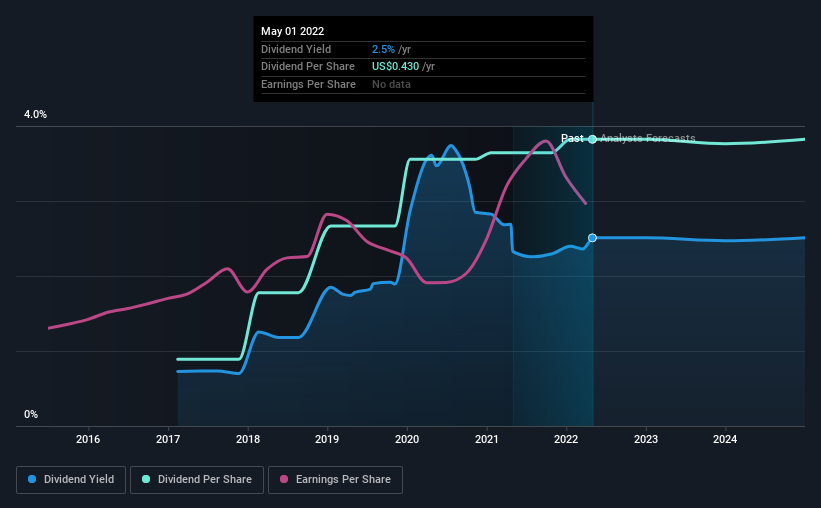Here's What We Like About Colony Bankcorp's (NASDAQ:CBAN) Upcoming Dividend
It looks like Colony Bankcorp, Inc. (NASDAQ:CBAN) is about to go ex-dividend in the next 2 days. The ex-dividend date is one business day before a company's record date, which is the date on which the company determines which shareholders are entitled to receive a dividend. The ex-dividend date is important because any transaction on a stock needs to have been settled before the record date in order to be eligible for a dividend. Thus, you can purchase Colony Bankcorp's shares before the 5th of May in order to receive the dividend, which the company will pay on the 20th of May.
The company's upcoming dividend is US$0.11 a share, following on from the last 12 months, when the company distributed a total of US$0.43 per share to shareholders. Based on the last year's worth of payments, Colony Bankcorp stock has a trailing yield of around 2.5% on the current share price of $17.14. If you buy this business for its dividend, you should have an idea of whether Colony Bankcorp's dividend is reliable and sustainable. So we need to investigate whether Colony Bankcorp can afford its dividend, and if the dividend could grow.
Check out our latest analysis for Colony Bankcorp
Dividends are typically paid from company earnings. If a company pays more in dividends than it earned in profit, then the dividend could be unsustainable. That's why it's good to see Colony Bankcorp paying out a modest 28% of its earnings.
When a company paid out less in dividends than it earned in profit, this generally suggests its dividend is affordable. The lower the % of its profit that it pays out, the greater the margin of safety for the dividend if the business enters a downturn.
Click here to see the company's payout ratio, plus analyst estimates of its future dividends.
Have Earnings And Dividends Been Growing?
Stocks in companies that generate sustainable earnings growth often make the best dividend prospects, as it is easier to lift the dividend when earnings are rising. If earnings decline and the company is forced to cut its dividend, investors could watch the value of their investment go up in smoke. This is why it's a relief to see Colony Bankcorp earnings per share are up 5.0% per annum over the last five years.
Another key way to measure a company's dividend prospects is by measuring its historical rate of dividend growth. Since the start of our data, five years ago, Colony Bankcorp has lifted its dividend by approximately 34% a year on average. It's encouraging to see the company lifting dividends while earnings are growing, suggesting at least some corporate interest in rewarding shareholders.
Final Takeaway
From a dividend perspective, should investors buy or avoid Colony Bankcorp? Colony Bankcorp has seen its earnings per share grow slowly in recent years, and the company reinvests more than half of its profits in the business, which generally bodes well for its future prospects. In summary, Colony Bankcorp appears to have some promise as a dividend stock, and we'd suggest taking a closer look at it.
With that in mind, a critical part of thorough stock research is being aware of any risks that stock currently faces. For instance, we've identified 2 warning signs for Colony Bankcorp (1 is a bit unpleasant) you should be aware of.
If you're in the market for strong dividend payers, we recommend checking our selection of top dividend stocks.
Have feedback on this article? Concerned about the content? Get in touch with us directly. Alternatively, email editorial-team (at) simplywallst.com.
This article by Simply Wall St is general in nature. We provide commentary based on historical data and analyst forecasts only using an unbiased methodology and our articles are not intended to be financial advice. It does not constitute a recommendation to buy or sell any stock, and does not take account of your objectives, or your financial situation. We aim to bring you long-term focused analysis driven by fundamental data. Note that our analysis may not factor in the latest price-sensitive company announcements or qualitative material. Simply Wall St has no position in any stocks mentioned.

